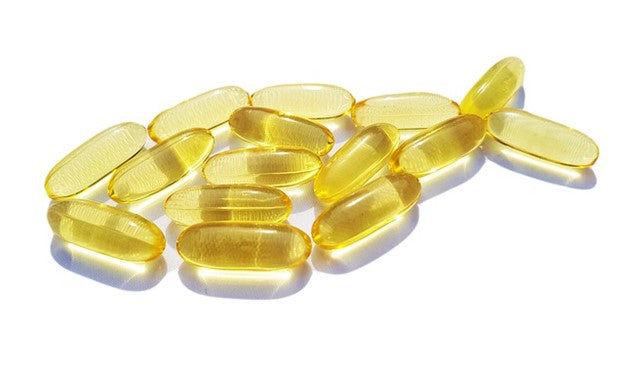Not all fish oils are the same, and if you've got to the stage where you can't see the wood for the trees, you’re not alone.
It's not so surprising given the vast number of products and brands available today. What makes matters confusing is the huge differences in fish oils.
Cheaper brands tend to contain much lower concentrations of fish oil/omega-3, making it necessary to take several capsules per day to maintain a therapeutic omega-3 level.
Be aware that many brands also show nutritional facts per serving (2 softgels) instead of per single softgel.
Read on to discover the factors which go into making an exceptionally pure omega-3 fish oil and to view a fish oil comparison chart.
What to look for when buying a fish oil supplement: Fish Oil Comparison Chart
The following chart published by WHC, shows how our UnoCardio 1000 compares to other leading brands.

You’ve heard about the many benefits of omega-3s (1) – for vision, for cognitive health, for the cardiovascular system – and you’re ready to purchase a fish oil supplement to augment your consumption of oily fish.
However, you soon find yourself confused by the sheer number of products available. They all purport to be the best, but clearly they can’t all be right.
In truth, there is a huge amount of variation between fish oils and it is vital to know what to look for before scouring the web in search of the best one.
There are several key considerations which come into play when reviewing supplements.
It is important to find a supplement which:
- contains high levels of EPA and DHA per serving
- uses small-species fish, which are less prone to accumulating toxins
- is made by a reputable manufacturer who follows good manufacturing practices (GMPs)
- has won a high rating from the IFOSP (2) (International Fish Oil Standards Program)
- contains no, or barely detectable traces of, contaminants.
It’s worth stressing that first point, since EPA and DHA are the most potent and therapeutically proven forms of omega-3, far superior to ALA, ETA, DPA etc.The higher the percentage of EPA and DHA in your supplement, the greater benefits you will enjoy.
Another thing you should think about is the molecular form of the omega-3 fatty acids. There are generally three: triglyceride, ethyl ester and phospholipid.The most bioavailable (3), by far, are triglycerides (since omega-3s actually occur naturally in the triglyceride form).It’s no surprise, therefore, that premium fish oils favour triglycerides.
It is a good rule to avoid fish oil supplements that contain soy, gluten and nuts, as these ingredients could suggest a manufacturing process which does not focus on purity.
Similarly, capsules which have an enteric coating, as these are usually synthetic and can be made from PVC or BPA, substances it is advisable to minimise consumption of.
Enteric coatings have been found to release the supplement prematurely in the digestive system.
The IFOSP is not the only third-party testing and certification programme. The independent American firm Labdoor also rank supplements (including fish oils) according to criteria such as Label Accuracy, Product Purity, Projected Efficacy, Nutritional Value and Ingredient Safety.
UnoCardio 1000 has been ranked #1 for quality since 2015. You can view the rankings here.
UnoCardio 1000 also holds a 5-star rating from the IFOS. We are proud to stock the world’s best quality fish oil.
Why UnoCardio 1000 contains vitamin D
Vitamin D has a different impact on the body than omega-3 fatty acids, and should not be taken as an alternative to fish oil.
The vitamin (actually a hormone) helps to maintain normal muscle function, immunity, healthy teeth and bones, and also contributes to normal blood calcium levels (4).
Its presence in UnoCardio 1000 means you don’t have to buy separate vitamin D and fish oil supplements
Combining the nutrients also helps you avoid two of the most prevalent dietary deficiencies in the world, namely omega-3 deficiency and vitamin D deficiency.
Studies (5)suggest that omega-3s EPA and DHA work together with vitamin D to maintain healthy levels of serotonin in the brain, thereby improving cognitive function and social behaviour with particular relevance for those battling ADHD, schizophrenia and bipolar disorder.
The above fish oil comparison chart is based on information provided by distributors online (24/2/25).
Learn more: The Health Benefits of Combining Vitamin D and Omega-3
Conclusion
If you take anything away from this article, it is the factors worth considering when shopping for a fish oil supplement.
Remember: choose a supplement which contains high levels of EPA and DHA per serving; a supplement which favours small-species fish, which are less likely to bioaccumulate toxins; a supplement made by a reputable manufacturer who adheres to diligent manufacturing practices (GMPs) and has achieved a high independent rating from the IFOSP (International Fish Oil Standards Program).
And lastly, a supplement which contains no, or barely detectable traces of, contaminants.
Learn more:
Omega-3 Fatty Acids: Are You Getting Enough?
Four Omega-3 Fish Oil Benefits That Will Surprise You
The Importance of Omega 3 Fatty Acids
Water for Health Ltd began trading in 2007 with the goal of positively affecting the lives of many. We still retain that mission because we believe that proper hydration and nutrition can make a massive difference to people’s health and quality of life. Click here to find out more.
Sources
1. NIH. Health Information. Omega 3 Fatty Acids. https://ods.od.nih.gov/factsheets/Omega3FattyAcids-Consumer/
2. IFOS. What is IFOS? https://certifications.nutrasource.ca/about/how-certifications-work/ifos
3. Dyerberg J, Madsen P, Møller JM, Aardestrup I, Schmidt EB. Bioavailability of marine n-3 fatty acid formulations. Prostaglandins Leukot Essent Fatty Acids. 2010 Sep;83(3):137-41. doi: 10.1016/j.plefa.2010.06.007. PMID: 20638827. https://pubmed.ncbi.nlm.nih.gov/20638827/
4. NHS. Vitamins & Minerals. Vitamin D. https://www.nhs.uk/conditions/vitamins-and-minerals/vitamin-d/
5. Science Daily. 2015. Omega-3 fatty acids, vitamin D may control brain serotonin, affecting behavior and psychiatric disorders.https://www.sciencedaily.com/releases/2015/02/150225094109.htm




























Leave a comment